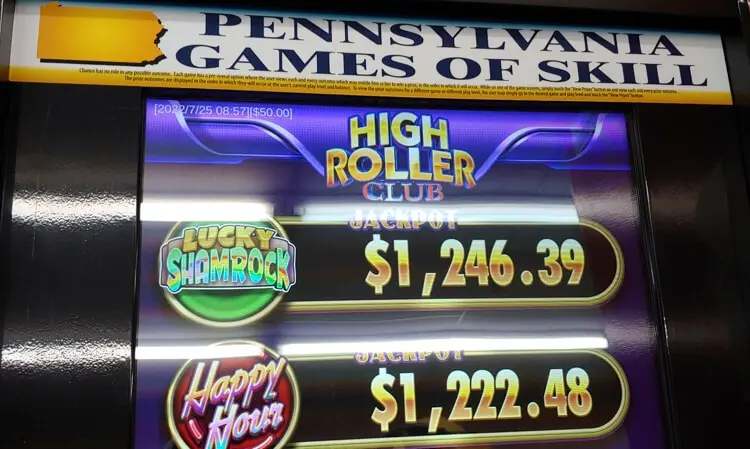The PA Lottery sold nearly $15 billion in scratch-off tickets from October 2017 to March 2022, but it says the number would have been another $650 million higher if not for the growth in competitive “skill game” gambling machines at lottery retailers and elsewhere.
The lottery’s primary vendor, Scientific Games, recently conducted an updated analysis of the impact of the unregulated devices — primarily known under the Pennsylvania Skill brand — which lottery officials contend are illegal, although that issue is still to be settled by a pending Commonwealth Court case.
The analysis, while not released and promoted publicly by the lottery bureau, was circulated this month to lawmakers, whom lottery officials are hoping will take action to explicitly ban the skill games. The officials have contended for years that the presence of the devices at bars, restaurants, clubs, convenience stores, and other outlets detracts from lottery sales, which generate more than $1 billion annually to fund Pennsylvania senior citizen programs.
The analysis states the presence and impact of the machines has become increasingly costly to the lottery over a five-year span. It estimated the scratch games in particular, which are the primary source of lottery revenue, would be generating 4.4% more in sales and provide some $165 million a year more in revenue if not for the competition.
“The appearance and expansion of Games of Skill machines across the Pennsylvania retail landscape has had significant negative impact on the revenue realized by the Pennsylvania Lottery,” the report states.
Skill games have other detractors too
Lottery officials have been vocal for several years in denouncing the growing skill games industry, receiving support at times from the Pennsylvania State Police, Pennsylvania Gaming Control Board, and individual casino operators. The new analysis seeks to add some weight to the argument, with updated dollar estimates.
The Scientific Games report said it combined field observations about the presence of skill games by lottery sales representatives with algorithms assessing the impact of those devices. Central to the report was observations about how much the skill games have spread within the same outlets that are contracted lottery vendors.
It reported there has been a nearly eight-fold increase from September 2017 to March 2022 in the number of lottery retailers housing the machines, with nearly 30% now doing so. And the number of skill game devices at those locations grew from 707 to 11,634 in that span, giving patrons far more alternatives for what to do with their discretionary gambling dollars.
“The Skill presence prediction algorithm shows that a significant, easily detectable impact on sales and sales trends occurs from the moment Skill machines are added to a store,” according to the report. “From day one post-install, Games of Skill machines made a clear, negative impact on scratch lottery sales at Pennsylvania retailers.”
Focusing on the 9,000-plus existing lottery retailers, the report stated:
Since 2017, the Pennsylvania Lottery retail network has seen:
- 17 times more Skill machines found on-site across the state.
- Eight times the number of retailers with at least one skill machine.
- Six times the maximum number of Skill machines found at any one retailer; and,
- The spread of Skill machines to every county in the Commonwealth.
In addition, the report said the presence of the machines at potential lottery outlets was hurting recruitment efforts to sign them up as vendors.
Some hope legislators will take notice
Lottery Press Secretary Ewa Swope, when asked about the analysis, said the lottery “commissioned this study to inform legislators of the dire impacts that these illegal games are having on the proceeds that help our seniors in Pennsylvania. We feel strongly that legislators should take action to crack down on these illegal machines and preserve hundreds of millions of dollars that help seniors afford prescriptions transportation, meals, and more.”
The lottery’s recent financial summary for the just-completed 2021-22 fiscal year noted it had revenue of $1.2 billion from $5 billion in sales last year, down from $1.3 billion in the prior year. Lottery officials did not specifically attribute that decline to the skill games competition, however.
In fact, the Scientific Games study covering 2017-22 stated “scratch sales have consistently grown during this timeframe,” while seeking to emphasize how much more in sales might have been achieved — an estimated $650 million in the span — if not for the wide and growing presence of the machines.
There is no indication what lawmakers will do with the new information, if anything, as they have lacked consensus on what to do about skill games for years. Some legislative proposals have sought to ban the devices, while others have sought to regulate and tax them. Still other lawmakers have looked to broaden legalization of another type of machine — video gaming terminals, which are now limited to certain truck stops.
The lottery analysis did receive support from Pennsylvanians Against Gaming Expansion, an entity funded by Parx Casino that has lobbied to shut down the skill games industry.
“This analysis should serve as a flashing red light for lawmakers,” said that organization’s spokesman, Pete Shelly. “It is time, once and for all, to tighten state law and shut these machines down.”
Photo: Gary Rotstein






